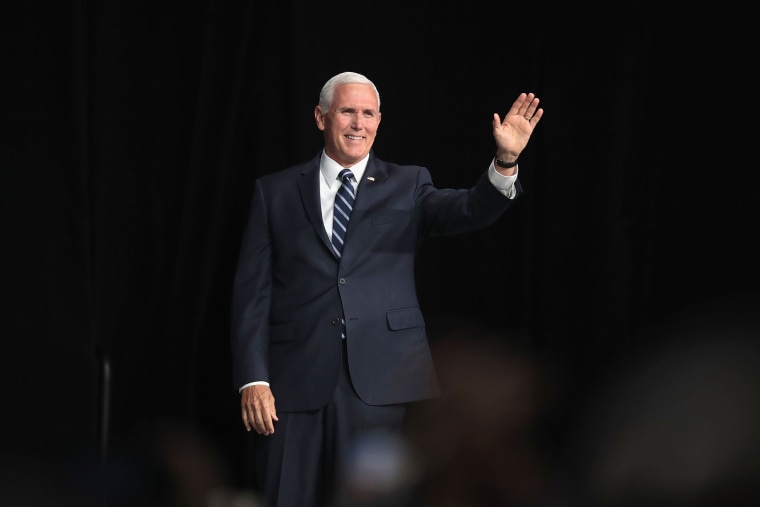MANCHESTER, N.H. — Former Vice President Mike Pence said Wednesday that he would consider testifying before the House Jan. 6 committee if invited to appear, but he suggested he would need to sort out thorny constitutional questions before committing.
“If ever any formal invitation were rendered to us, we’d give it due consideration,” he said, in reply to a question posed to him at the New Hampshire Institute of Politics’ “Politics & Eggs” series.
Afterward, a spokeswoman for the House committee declined to comment on whether it plans to ask Pence to appear. In a recent interview with NBC News, the committee’s chairman, Rep. Bennie Thompson, D-Miss., said both Pence and former President Donald Trump “are on our agenda to be talked about as we meet.”
If he were to go through with it, Pence would be an invaluable, firsthand witness to Trump’s efforts to retain power after the November 2020 election.
In its summer hearings, the committee presented evidence that Pence was at the receiving end of Trump’s persistent campaign to subvert the popular will. Trump had prevailed on his No. 2 to use his ceremonial role presiding over the Electoral College vote count to block the certification of Joe Biden’s victory. Pence refused, severing their political partnership.
Pence, in his remarks, mentioned a caveat that might deter him from testifying. “It would be unprecedented in history for a vice president to be summoned to testify on Capitol Hill,” he said. “But I don’t want to prejudge.”

There have been several examples of presidents or vice presidents testifying to Congress, however, including in 1974, when then-President Gerald Ford testified publicly before a congressional committee about his decision to pardon Richard Nixon in the Watergate scandal.
One mystery Pence could solve is what he told Trump during a tense phone call Jan. 6, in the hours before rioters ransacked the Capitol building and threatened the vice president's life. Pence took the call with aides present, but left the room, making it impossible for them to hear what he said or how he reacted to Trump’s entreaties.
In a speech and question-and-answer session that lasted about an hour, Pence also edged closer to confirming that he plans to run for president in 2024.
“I never spent a lot of time in New Hampshire, but I may someday,” he said of the state that traditionally holds the nation’s first presidential primary
Pence has been making numerous appearances in states holding early presidential contests, giving what amounts to a stump speech that combines attacks on the Biden presidency with his own vision of conservative political leadership. He tends to dwell more on former Republican President Ronald Reagan than on Trump, and though he avoids direct criticism of his former boss, he leaves no doubt that he believes the ex-president needs to drop his unfounded complaints that the 2020 election was stolen.
“Now more than ever, leaders in our party … need to be focused on challenges facing the American people today and offer positive, proven solutions for tomorrow,” he said.
He even took a veiled swipe at Trump’s delight in large political rallies. One reason he said New Hampshire deserves to hold the first primary is it forces candidates to meet voters face-to-face. “Get ’em off the big stages,” he said. “Get ’em off the television screens and put them in a little room.”
Yet, he largely echoed the GOP’s outcry over the FBI search at Trump’s Mar-a-Lago home and called upon Attorney General Merrick Garland to release more information on the purpose of the search.
“Never before in American history has the personal residence of a former president been subject to a search warrant,” he said. “In the wake of the four years we endured — the politicization of the FBI — the American people have a right to know the basis for this. This unprecedented action does demand unprecedented transparency.”
In neither condemning Trump outright nor praising him, Pence is straddling a line that might be impossible to sustain over the long course of a presidential campaign. On his way out the door, one member of the audience privately groused that Pence said virtually nothing about the one question on “everybody’s mind”: what happened to him on the day when the U.S. nearly lost its democracy.
Pence’s message is “a work in progress,” Tom Rath, a former Republican National Committee member from New Hampshire who had come to hear his speech, said in an interview. “What they’re trying to do is create space and take advantage of that space and not engender a huge pushback” from the Trump forces.
